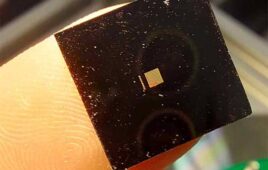 Startup SetPoint Medical has demonstrated “significant, sustained improvement” over two years in a first-in-human study using bioelectronic therapy in patients with rheumatoid arthritis (RA).
Startup SetPoint Medical has demonstrated “significant, sustained improvement” over two years in a first-in-human study using bioelectronic therapy in patients with rheumatoid arthritis (RA).
Seventeen subjects with moderate to severe symptoms were implanted with a vagus nerve stimulator in the European study. At three months, the therapy was shown to have significantly reduced RA symptoms and inhibited cytokine production, according to the company. After 24 months, 87% reported had clinically meaningful responses by standard Annual European Congress of Rheumatology (EULAR) criteria.
The Santa Clarita, Calif.–based company presented the results in a poster at EULAR in Amsterdam this week. Its initial study was published in Proceedings of the National Academy of Sciences in 2016.
SetPoint’s bioelectronic medicine platform stimulates the inflammatory reflex with digital doses of electricity to produce a systemic anti-inflammatory effect. The most recent results demonstrate that bioelectronic medicine has the potential to substantially reduce both clinical rheumatoid arthritis disease activity and patient disability for two years, with no unexpected safety issues, the company said in a statement. The improvements were maintained in patients with and without concurrent use of medication.
Rheumatoid arthritis is a chronic inflammatory disease that affects 1.5 million people in the United States and costs tens of billions of dollars annually to treat. It is not unusual for patients to stop responding to powerful immunosuppressive drugs or to stop treatment, according to SetPoint chief medical officer David Chernoff, MD.
“There is an unmet medical need for alternative approaches for the treatment of RA,” Chernoff said in the statement. “Reducing disease activity to as low a level as possible is an important goal in the management of patients with RA in order to reduce permanent joint damage and improve quality of life.”
SetPoint recently initiated a pilot trial evaluating the company’s proprietary device for treatment of drug-refractory RA patients in the U.S.
Investors in the company include Morgenthaler Ventures, New Enterprise Associates, Topspin Partners, Medtronic, GlaxoSmithKline’s Action Potential Venture Capital Limited and Boston Scientific.




